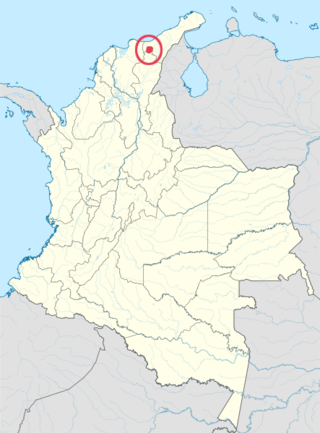Wiwa language
Appearance
(Redirected from Sanhá language)
| Dʉmʉna | |
|---|---|
| Dʉmʉna | |
| Native to | Colombia |
| Region | Sierra Nevada de Santa Marta |
| Ethnicity | Wiwa people |
Native speakers | 1,850 (2007)[1] |
Chibchan
| |
| Language codes | |
| ISO 639-3 | mbp |
| Glottolog | mala1522 |
| ELP | Guamaca |
 | |
Dʉmʉna (also known as Damana, Malayo, Wiwa, Arosario, Arsario, Guamaca, Guamaka, Maracasero, Marocasero, Sancá, Sanja, Sanka, Wamaka)[2][3][4] is a Chibchan language spoken by the indigenous Wiwa people on the southern and eastern slopes of Sierra Nevada de Santa Marta in northern Colombia. According to Ethnologue, it was spoken by 1,850 people in 2007;[4] however, according to the Colombian Ministry of Culture, there were 13,627 Wiwa people in 2010, of whom some 60% speak Dʉmʉna well.[5]
Phonology
[edit]Vowels
[edit]There are seven phonemic vowels in Dʉmʉna:[6]
| Front | Central | Back | |
|---|---|---|---|
| Close | i | ɨ | u |
| Mid | e | ə | o |
| Open | a |
Consonants
[edit]Dʉmʉna has 19 phonemic consonants:[6]
| Labial | Dental/ Alveolar |
Palatal | Velar | Glottal | ||||||
|---|---|---|---|---|---|---|---|---|---|---|
| Nasal | m | n | ||||||||
| Stop | p | b | t | d | tʃ | dʒ | k | g | ||
| Fricative | s | z | ʃ | ʒ | h | |||||
| Flap | ɾ | |||||||||
| Trill | r | |||||||||
| Continuant | w | l | ||||||||
References
[edit]- ^ Dʉmʉna at Ethnologue (18th ed., 2015) (subscription required)
- ^ "Sanka". Ethnologue. Retrieved 4 November 2024.
- ^ "Malayo". Script Source. Retrieved 4 November 2024.
- ^ a b "Malayo". Ethnologue. Archived from the original on 13 April 2018. Retrieved 12 April 2018.
- ^ "Un poco más de la mitad de la población wiwa habla bien la lengua damana" [A little more than half of the Wiwa population speak Damana well]. Ministerio de Cultura, Colombia (in Spanish). 24 February 2010. Archived from the original on 27 March 2010. Retrieved 12 April 2018.
- ^ a b Trillos Amaya, María (2000). Sintesis descriptiva de los sistemas fonológico y morfosintático del Damana. In González de Pérez, María Stella and Rodríguez de Montes, María Luisa (eds.), Lenguas indígenas de Colombia: una visión descriptiva: Santafé de Bogotá: Instituto Caro y Cuervo. pp. 749–756.
External links
[edit]- Wiwa page on the language (Spanish, Dʉmʉna)
- SIL Language and Culture Archives' list of Dʉmʉna words
